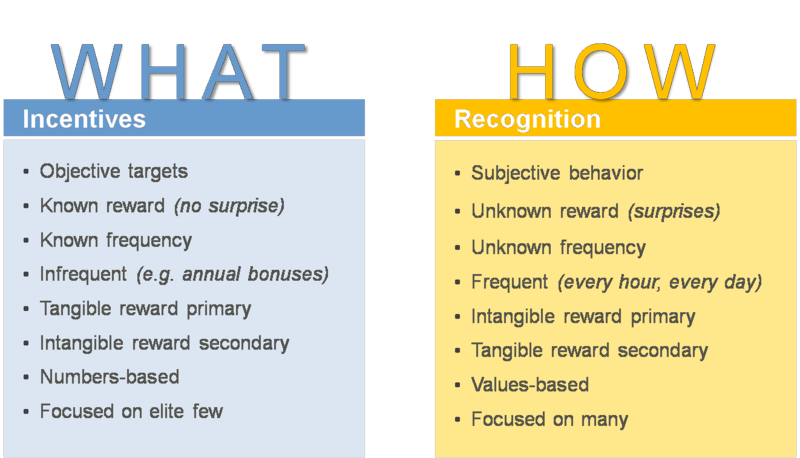According to SHRM/ Globoforce Employee Recognition Survey 2015, top 3 challenges faced by HR professionals are turnover, employee engagement and succession planning. Luckily, effective recognition programs which align with corporate values (values-based recognition) can be the most comprehensive solutions for all of three following concerns.
All organizations have their own values and try to communicate these values to their employees, customers, partners and the whole world. However, they often prefer to focus on the direct ways which can lead to immediate results rather than invest in long-term processes. How to deliver the company’s core values to employees is the most raised question among HR professionals.
Incentives vs. recognition

Many executives and managers consider incentives and recognition the same. But it’s not really, even though they are all the ways to motivate employees to achieve the company’s goals. Incentives programs focus on final results while recognition programs focus on the whole process to get the results. Of course, the real effects of these programs on employee performance are different. And values-based recognition programs are much better than traditional incentives programs with only yearly rewards. The best practice is the combination between incentives and recognition to timely boost employee engagement.
Why values-based employee recognition programs really work?

Employee recognition programs in general and values-based recognition programs in particular shares the common objective to make employees feel appreciated and recognized to leverage their positive contribution to the organization. To sync your company’s core values with employee behaviors, the best way is to create a culture of mutual understanding, respect and dedication. Here are some surprising benefits of values-based recognition programs:
- Increase employee satisfaction

By timely and continuous recognition, employees feel that their efforts and contributions are appreciated in both material and spiritual ways.
- Boost employee engagement and productivity

When employees feel that they are an essential part of your company’s picture, more efforts are put into their works. Moreover, a strong sense of corporate core values drives employee contribution and commitment to the company. We can voluntarily work extra when feeling connected with the whole company, right?
- Reinforce corporate culture

Obviously, values-based recognition programs help to reinforce corporate culture and even employee relationships. Furthermore, it helps to manage corporate core values better.
- Attract and retain talents

An effective valued-based recognition program can help the employer build a stronger brand. The company with amazing culture will be the destination of all talents, and the place where top performers want to stay in a long term.
You may be interested in How to deal with 13 types of talented but difficult employees?
How to make a values-based recognition program successful?
A recognition program only benefits your company if it is done correctly. These are some secrets that you must know to create an effective values-based recognition program:
1. Translate your company’s core values into specific behaviors

Clearly defined values are not enough. As mentioned above, every company has its own values. However, a list of core values will make no sense if you can’t communicate them to your employees. The key here is to translate core values into specific behaviors that your employee can easily do in their daily tasks.
You may also like What you can learn from 10 best organizational culture examples?
2. Deeply understand your employees' needs and expectations

Even in recognition program, you also need a marketing mindset. It means that you need to do research on what your employees want, need and desire to build a suitable program for them. It requires a lot of efforts to understand every single employee in your organization, but its results will surprise you!
3. Regularly monitor progress and evaluate process

After establishing a values-based recognition program, you need to monitor regularly and evaluate the results to make sure it works in right track. Any inappropriate practices should be correct timely.
How should organizations optimize this trend to achieve overall goals?

Organizations should integrate their core values into every session that employees involve in - from recruitment to retention to win the corporate objectives.
- In recruitment: Build strong corporate values to attract the best candidates
- In onboarding: Educate the core values of your company to make new hires feel connected and committed
- In engagement: Continuously reinforce your company’s culture and communicate core values to employees through daily behaviors
- In retention: Make sure your employees feel satisfied with their job and appreciated enough to keep their loyalty.

In conclusion, always keep in mind that employees are the most valuable asset of every organization to achieve the bottom line. Once you put them in central, they will return the best for you.












Replies to This Discussion